3.5*
Girls. Inmates. Idiots. Imbeciles. Morons. Undesirable. Feebleminded. All interchangeable. All degenerates.
This book will absolutely break your heart, but it will also give you hope and inspiration at the strength of human spirit. Back in the day (this is set in the 1920s), anyone who was different (in really any way, but in this book, we are dealing mostly with developmental differences, though race and general disability seem to have a role as well) was deemed "wrong". And in this story, we follow four young women who were deemed such, and who very much are not, in any way, "wrong". The world being more brutal and intolerant of differences acted upon this by institutionalizing these women.
Truly, their journeys are absolutely the highlight of the book, and also the hardest part of the book. You know that so many people existed in these very conditions, and it's quite difficult to read at times. But if you can handle it, it's something we really should be reading about. There are still plenty of injustices in the world, and putting ourselves into the shoes of another can only generate more empathy and humanity.
While I adored the characters, I couldn't help but feel a bit disconnected from them. I can't quite pinpoint why, but I just didn't feel like I was totally immersed in their world, even though I did care about them as characters. I will also say that there are a few times that I thought the book felt a bit draggy in the middle, which is maybe unfair because I am sure the lives of these women were also monotonous at times, but it felt worth mentioning.
Bottom Line: The good absolutely outweighed the bad, as I was grateful to have this glimpse inside such a horrible atrocity inflicted upon such strong and lovely young women.
